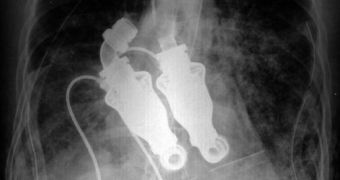Jakub Halik underwent heart surgery on April 3rd, at which time his heart was replaced with a mechanical one. This is the first successful case in which a man survived said transfer, living for six months with no pulse.
According to Medical Daily, the artificial pumper spins at 10,000 rotations per minute, performing all the actions the human organ can perform. The mechanism comprises two devices, one that fuels lungs with blood, and another that sends oxygenated blood back into the blood stream.
Halik had to undergo the pioneering surgery after investigations revealed a tumor spreading in his ventricles. He is a former firefighter and his body gave no signs of distress until, one day, he simply collapsed and had to be taken to hospital. The man started displaying internal bleeding, kidney failure and muscle weakness soon after.
Jakub Halik is 37 years old, and lives in the town of Neratovice in the Czech Republic. He is a husband and a father of one. When he was told that he had one year left to live if he didn't undergo the risky, experimental operation, he took a chance and hoped for a miracle.
"It was hard for me but I didn't have any other chance at all. It was acknowledged that with the tumor I can survive for about one year and I decided to fight and do it this way," he explained.
The operation was performed at Prague's Institute for Clinical and Experimental Medicine, and it went on for a grueling eight hours. The pumps implanted into the man's thoracic cavity were each 20cm large, and have propellers attached to them. They are powered by batteries that have to be recharged every eight to twelve hours.
This is the second attempt at an artificial heart implant in history. The first ended in tragedy, as patient Craig Lewis was subjected to the procedure in Texas, in 2011, but passed away two weeks after.

 14 DAY TRIAL //
14 DAY TRIAL //